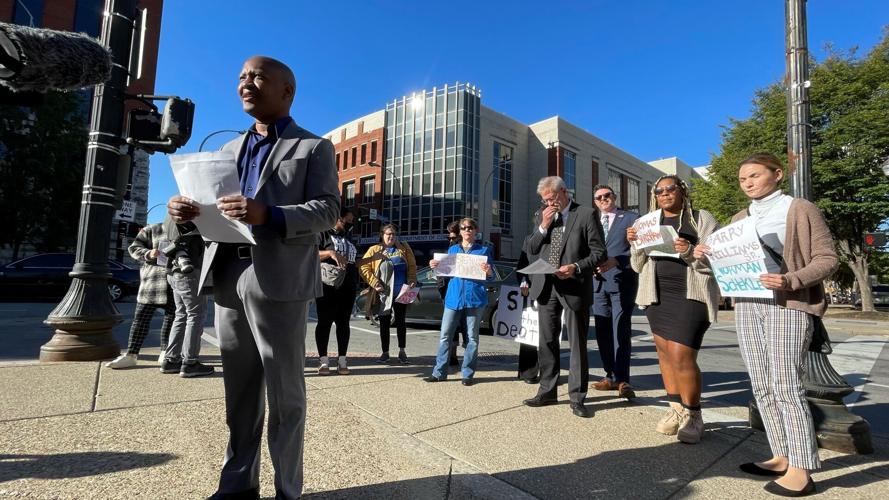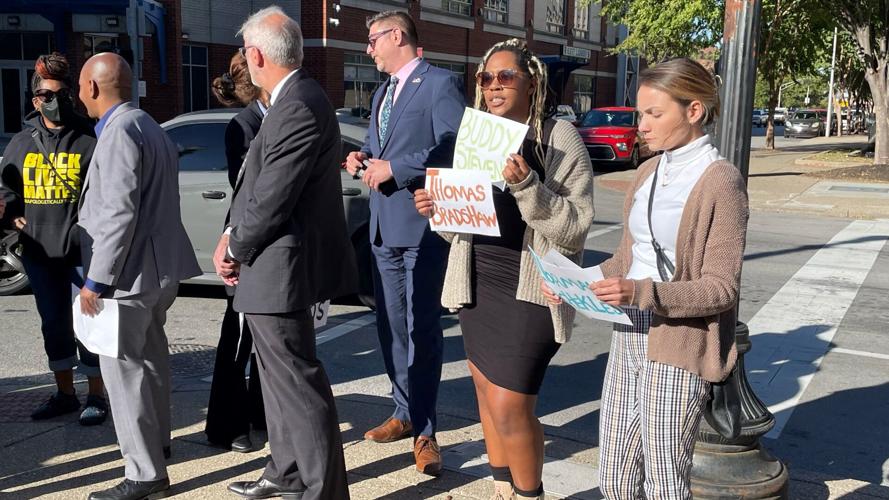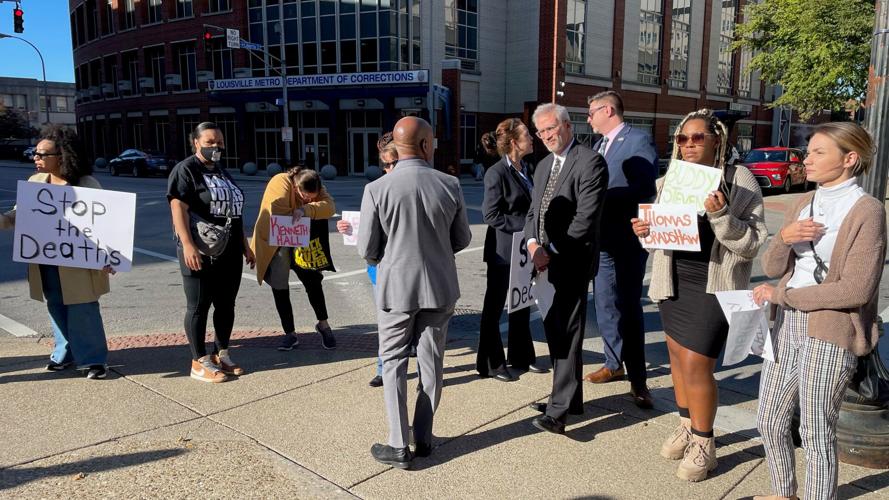LOUISVILLE, Ky. (WDRB) -- A demonstration against recent inmate deaths at Louisville Metro Corrections took on new urgency Tuesday morning when protesters learned that another inmate had died just hours earlier.
Representatives of the ACLU of Kentucky had already planned the 10 a.m. protest in front of Louisville Metro Corrections when they learned of the death of 39-year-old Bashar Ghazawi, who was found unresponsive in his cell about about 7 p.m. on Monday. He was pronounced dead at University Hospital shortly after 8 p.m.
Ghazawi's death came just hours after he was convicted by a Jefferson County Circuit Court jury of killing his wife, Noor Ghazawi, back in July 2017.
Ghazawi is the 12th person to die at Louisville Metro Corrections in the past 10 months. It is the fourth death at the jail since Director Jerry Collins took over in April.
The death also comes after a recently released report from an outside consultant hired to investigate Louisville's jail. The expert called the facility obsolete, poorly designed, and riddled with "poor practices."
Demonstrators voiced their concern Tuesday morning.
"Being held in Metro Louisville Jail should not be a death sentence," said Kungu Njuguna, a strategist for the ACLU of Kentucky. "Every human being, regardless of what he or she has done, is a human being worthy of dignity and respect. And they are not getting that inside this facility behind us."
Harriett Rankin was formerly incarcerated at LMDC, struggling with drug addiction.
"We should not have to die in there because we make bad choices in our lives," she told people in attendance at the demonstration.
She stood alongside the ACLU and other community groups demanding action.
"People are asking for help, help them," she said. "Don't lock them up. Don't throw them away. Don't forget about them. Those are real people in there. Real people."
She and others called on LMDC to end its contract with Wellpath, the company that currently provides healthcare to inmates.
The ACLU and other groups claim medications are withheld and health complaints go ignored, and ultimately Wellpath provides no addiction or mental health care, which is what they say is needed to prevent more deaths.
"We have many people across the nation dying to drug overdoses and suicide in jail, totally preventable," said Chanelle Helm, a representative of SisterSong. "It should make everybody upset because at anytime it could be any one of us."
They are asking LMDC to instead choose community-based healthcare groups to provide care, arguing it will save the city money, provide better care and prevent more deaths.
"I don't want a single person to die again in the building that's across from me," Njuguna said. "And we can get that accomplished. If our city leaders will listen to us and take action."
On Tuesday afternoon, Major Darrell Goodlett, a spokesman for the Louisville Metro Department of Corrections, issued a statement saying in part that the agency regularly reviews its relationship with Wellpath:
"The Louisville Metro Department of Corrections is committed to working with vendors who will provide the best possible services to the population we are responsible for. Considering recent deaths at Metro Corrections, we understand the ACLU's concerns with the contract for medical and mental health services that Metro Corrections has with Wellpath. Like all vendors, Wellpath's ability to meet the needs of the incarcerated population is reviewed regularly. Director Collins is working closely with community stakeholders and Wellpath to provide healthcare and mental health services that are designed to meet the changing needs of people in our care. Special attention is being given to the areas of mental health services and substance use disorder. For the first time in several years, both a psychiatric nurse practitioner and a psychiatrist both see patients at LMDC. Also, Metro Corrections, Wellpath, and the MORE Center have partnered to provide medication assisted treatment to those who suffer from opioid use disorder. Director Collins meets regularly with community stakeholders, including the ACLU, and is looking forward to a continued dialogue."
Jessica Wethington, a spokeswoman for Louisville Mayor Greg Fischer's office, issued a similar statement:
"We prioritize the life of every incarcerated individual, and we remain committed to exploring all options to keep our employees and our incarcerated population safe, including working with community organizations and our justice partners. As with all Louisville Metro Government agencies, Metro Corrections continuously evaluates its relationships with contractors and seeks the best possible services for the residents of Louisville."
WDRB also reached out to Wellpath for comment. Senior Vice President Teresa Koeberlein sent this statement:
“Wellpath holds patients at the center of everything we do. Our company promotes rigorous standards of care, nurtures innovation, and values compassionate service. We are always striving to improve the care we bring to our patients.
Correctional healthcare is a unique clinical environment most akin to emergency rooms. Our staff usually has no prior provider relationship with their patients, and so our goals are to quickly assess a patient’s health status and develop diagnoses. In so doing, we work with a wide range of partners to connect our patients with the care they need. Many of our patients may be diagnosed with an acute or chronic disease process for the first time under our care; many have been previously untreated for such conditions for an extended period before our first contact with them. These factors make them more difficult to treat, and we are proud of the way that our dedicated team of caregivers perform under these trying conditions.
Respectful of our patients’ privacy needs, and mindful of State and Federal healthcare confidentiality laws/regulations, we cannot speak to individual incidents of care, but we do not believe the claims allegedly advanced by the ACLU have merit.”
Related story:

















